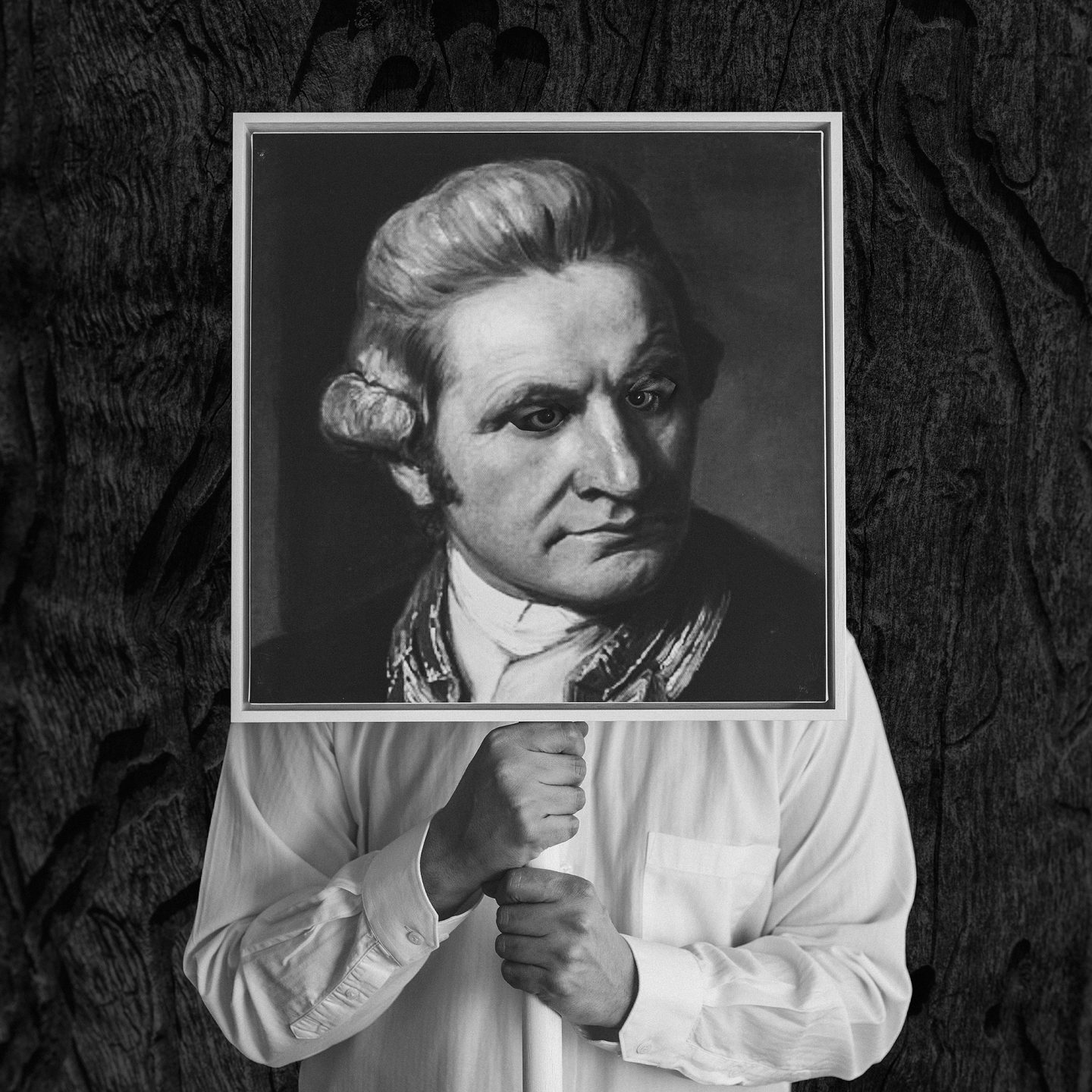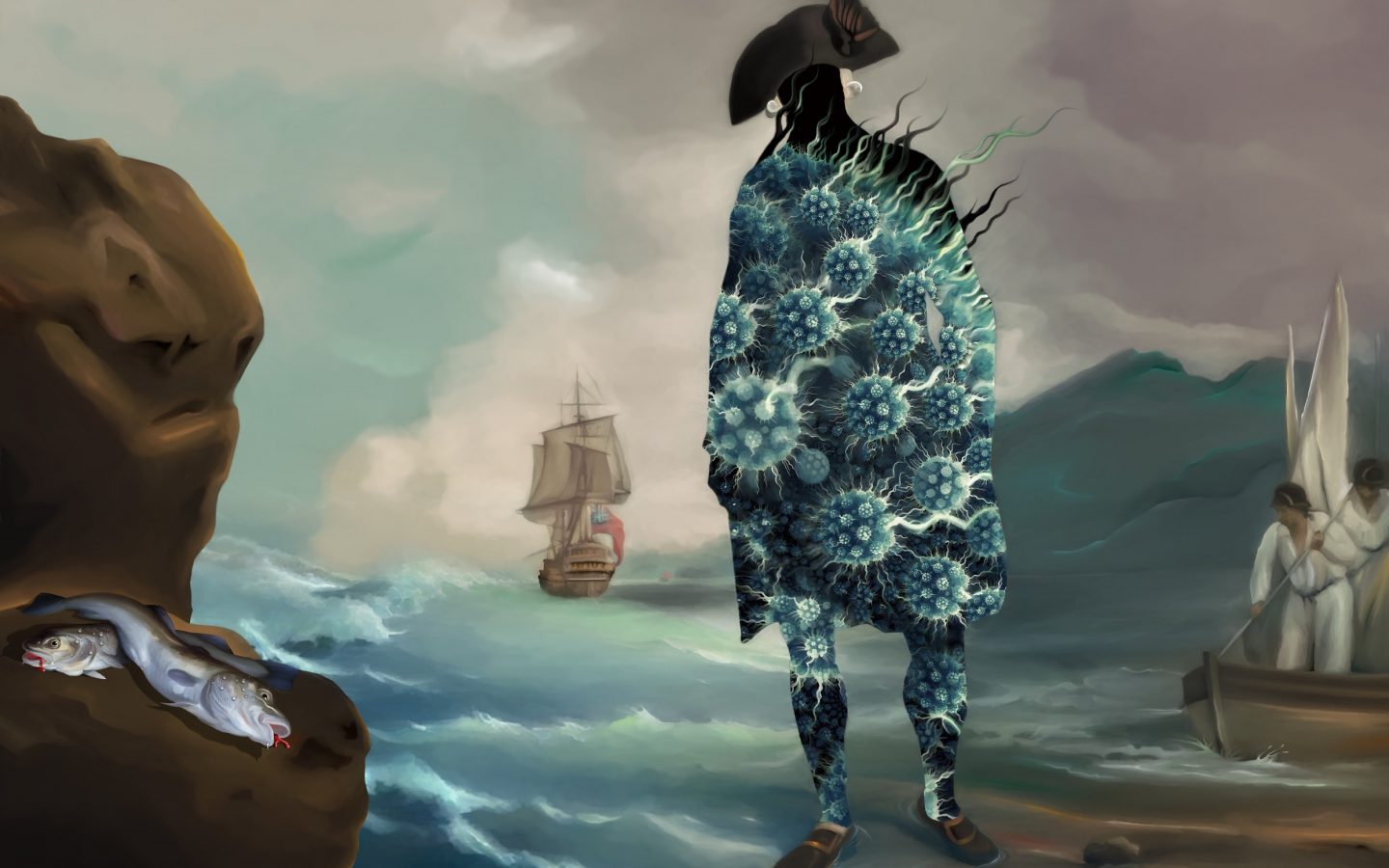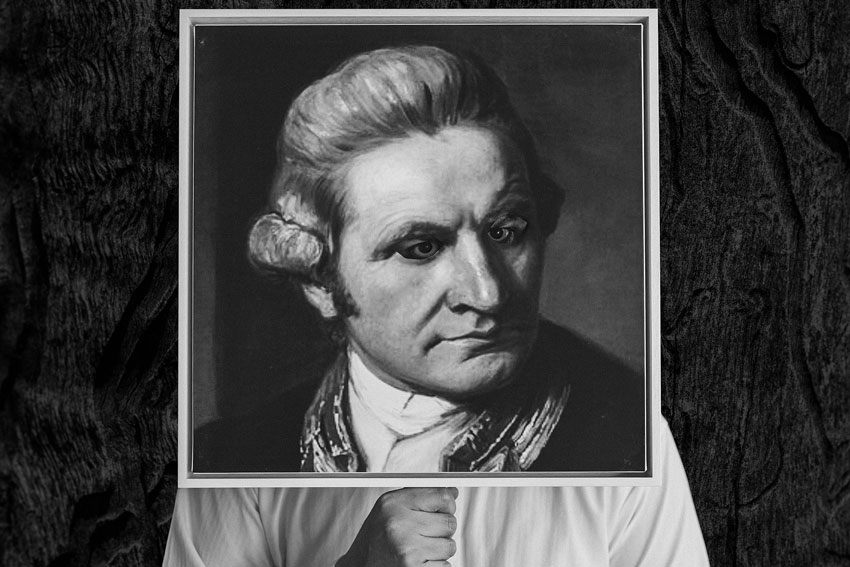
Walter Marsh
Walter is a writer and editor living on Kaurna Country.

The sight of armed police guarding a statue of Captain Cook from protestors offered a surreal illustration of modern Australia’s white-knuckled defence of our colonial mythos. A collection of work at Flinders University Museum of Art shows these questions aren’t new – and aren’t going anywhere.
COVID-19 has scuttled many plans in 2020, but one that has received scant commiseration was the cancellation of a planned $6.7 million circumnavigation by a replica of Captain Cook’s ship The Endeavour. The decision to celebrate the 250th anniversary of Captain Cook’s landing (often mischaracterised as his ‘discovery’ of the continent) with a circumnavigation (which Cook never did) was the latest, slightly baffling evidence of a cult of Cook subscribed to by many of Australia’s leaders.
In response to the anniversary and many of its now-cancelled celebrations, co-curators Dr Ali Gumillya Baker and Fiona Salmon set out to showcase how Cook’s arrival – and the colonial legacies he now symbolises – have long been contested by Aboriginal and Torres Strait Islander and non-Indigenous artists alike.
“We can’t change the past, but we can certainly shift our relationship to it,” Dr Ali Gumillya Baker says of the conversations that underpin In the hold | Decolonising Cook in contemporary Australian art.
“Obviously, it’s framed by the whole anniversary,” Salmon explains. “But we conceived it as a provocation, a way to counter the commemorations and give voice to alternative views on the nation’s recent past. The idea of Cook as a founding father and heroic figure was being pushed very hard when dollars started flowing and we wanted to interrogate that.”

“The exhibition enables us to look at Cook in ways that are more nuanced with works by Gordon Bennett, Sandra Saunders, Christian Thompson and Vincent Namatjira, for example, challenging dominant narratives and recasting Cook’s symbolic power.”
“Alternative views of Cook as a cipher of colonialism are amplified in the graphic works by non-Indigenous artists Chips Mackinolty (The first pandemic) and Therese Ritchie (They all look the same to me) whose representations are a razor-sharp reminder of the link between colonialization and spread of infectious disease.”
The exhibition’s scope is broad, from the Eurocentric gaze of artists who accompanied Cook on his voyages and encounters with First Nations peoples, to Vincent Namatjira’s Ramsay Art Prize-winning 2018 work Close Contact, which inextricably binds the image of Cook to a contemporary Aboriginal perspective. In between is a wide range of mediums and narratives that add vital depth and complexity to our national history and its modern repercussions.
“It’s a real showcase of some of the superstars of Aboriginal art and jewels of the FUMA collection,” Gumillya Baker notes. “You’ve got some incredible, prolific and important artists from Judy Watson to Gordon Bennett, Fiona Foley and Julie Gough; we are privileged to have all their work here.”

Other works, such as Queenie McKenzie’s 1996 screenprint Osmond Creek (Dadah aw Ning) which depicts the extra-judicial killing of an Aboriginal boy by two police officers in Western Australia, shines a light on aspects of Australia’s history after Cook that many would rather be left in the past.
“That’s a really important work in speaking to that idea of the stories of the past that have been hidden – stories of genocide and massacre – they’re stories that in a way contradict these other narratives, and they need to be recognised as much a part of our national learning,” Gumillya Baker says. “Our capacity to have community in the future really depends on the control of symbolism; the fierce control of symbolism is really about taking control of how the past is represented into the future. And we need to shine a light there, and have the conversations.”
While the circumnavigation never went ahead, the impact of Black Lives Matters protests in foregrounding such occasionally iconoclastic discussions – and the heavy-handed response as seen in the statue’s armed guard – are a reminder of how historic symbols are intrinsically linked to modern-day outcomes.
“What made me feel really emotional was reading the words of Tanya Day’s daughter, who tweeted not long after the inquest in Melbourne that if only the police had protected her mum like they protected their statues – something that doesn’t move is being guarded,” Gumillya Baker says. “What is this fierce, protective response to particular symbols about?
“In some ways Vincent Namatjira’s work begs this very question – a flimsy, two-dimensional representation of Cook that’s not based in any kind of integrity is nothing more than a prop if the stories behind the man don’t stack up, or the promise of wealth and prosperity he embodies hasn’t flowed to our First Nations people.
“The breadth of the show demonstrates that these conversations are not new; Gordon Bennett’s Message in a bottle was painted in 1989,” Baker says. “However, it seems there’s a receptiveness to and renewed opportunities for these conversations.
“Challenging that neat narrative that’s all sewn up – and breaking it up.”

As part of the exhibition’s public program, a free, virtual symposium In the hold | Decolonising Cook in art, performance and text will be livestreamed on Thursday 24 September 2020.
Co-hosted by Flinders University Museum of Art and College of Humanities, Arts and Social Sciences, and presented in partnership with University of Tasmania Cultural Collections, this event will bring leading Indigenous and non-Indigenous artists, curators and academics into conversation to interrogate Cook as an idea, a symbol, and a myth that continues to grip the public imagination. Find out more and register here.

Walter is a writer and editor living on Kaurna Country.